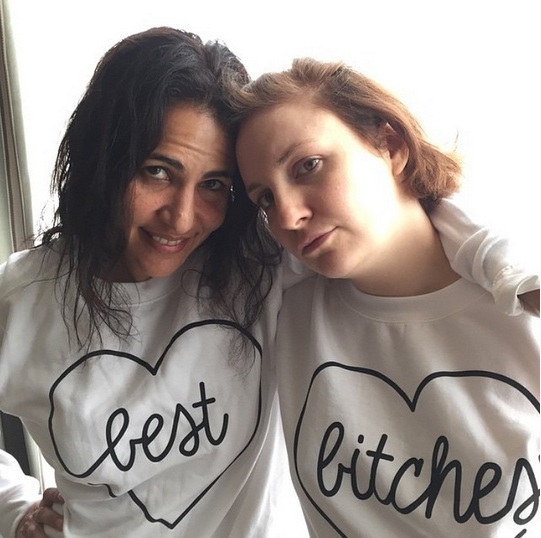How Doomed Are All of These Celebrity Lifestyle Sites?
Last week was a seminal one in the world of celebrity-led lifestyle brands. On September 30, Lena Dunham and Jenni Konner launched Lenny, a feminist newsletter that was briskly praised by critics and fans alike. That same day, in a move that couldn’t have been more ironically timed, Blake Lively announced that she was shutting down her much-maligned lifestyle site, Preserve. The news kept coming. On October 2, Reese Witherspoon announced that she had raised $10 million in venture capital funding to help fuel the growth of Draper James, her southern living-inspired collection.
Yes, these are just three examples of famous people who have attempted to transform their personal brands into something more profitable than a compelling Instagram account or a couple of hit movies. Gwyneth Paltrow’s newsletter-turned-e-commerce entity GOOP is in the process of raising funds, Jessica Alba’s The Honest Company raised $100 million in August and is said to be valued at $1.7 billion, and in July, Ellen Degeneres launched a clothing line. If you’re a likeable celebrity – at least to a significant portion of the population – and you have a point of view, there seems to be no other option than to get something going.
Yet there is a question niggling these glossy startups. Can they really make real money?
The answer is not so clear. The formula seems like a no brainer from a marketing perspective. Cool famous person + good product = $$$. Consider things like Elizabeth Taylor’s White Diamonds, which remains a top-selling fragrance even as other, stinkier, celebrity perfumes have tanked. Or celebrity-run fashion lines like Ashley and Mary Kate Olsen’s The Row or Victoria Beckham’s namesake label, which long ago became less about the name and more about the beautiful clothes.
The difference here, though, is that these new businesses are driven by the person, not the product. What is Draper James without Reese, or GOOP without GP? Nothing, at least not yet. The exception, of course, is The Honest Company, whose concept relies less on Alba and more on a genuine need in the market for non-toxic household products. Perhaps that’s why it’s headed toward an initial public offering, one that could make Alba a billionaire. “If you look at Jessica Alba at Honest, she was a mom first who had a really passionate vision for what that brand was going to be. If she was just another mom, my sense is that company would still have worked,” says Lawrence Lenihan, co-founder of New York-based venture capital firm FirstMark Capital. “But, given a great product and a real product-level connection with his/her customer, celebrity adds enormous energy to this relationship and the brand and it can be an incredible asset. I think the problem with a lot of these celebrity brands is that they’re just vehicles for the celebs. Making a great product is hard.”
Instead, the model of many of these companies seems to be closer to that of Martha Stewart’s, who combined content with commerce long before putting those two words together filled the stomachs of investors with butterflies. Yet Stewart stands apart from her hopeful clones in more ways than one. She built her brand through the cobblers she baked, the mosaic tiles she arranged, the green glass she collected: Celebrity came later. Stewart is also an example of how challenging it can be to make a lifestyle-driven business work. When Martha Stewart Living Omnimedia Inc. went public on the New York Stock Exchange in 1999, shares opened at $18 but soon reached $38, making Stewart an instant billionaire. In June 2015, the company was sold to Sequential Brands Group for $6.15 per share. This was nearly a year after Stewart had made a deal with Meredith Corporation to handle the business side of publishing her magazines, which had been losing money for years. Sure, there was that whole jail scandal in between. But something tells me Stewart’s current troubles have more to do around the limits of a lifestyle business.
Here’s the thing about so-called “lifestyle” businesses. In the venture capital community, the phrase is jargon for companies that might work well on a small, sustainable scale, but are unlikely to grow into something worthy of a major investment. The forever question: Can you transform a passion project into something scalable? Something worthy of outside funding? There are certainly plenty of investors who believe that celebrities in particular have the power to take these brands further. The key for gaining their confidence, however, seems to be as much about the team around the celeb as it is the celebrity herself. Alba has serial entrepreneur Brian Lee, Gwyneth Paltrow has women’s media vet (and former Martha Stewart ceo) Lisa Gersh. “Assuming the idea is sound, then the business needs real attention and passion from the celebrity,” says Brian Sugar, founder and ceo of POPSUGAR, a media and technology company for women. “And a talented operator that runs the business.”
Regardless of whether or not any of these startups have the potential to be billion-dollar companies is still unclear. What is clear is that many of them want to be. But I’d argue that ambition may be misplaced. When I interviewed Dunham and Konner about Lenny last week, I asked them how they planned on making money. Through the typical avenues – advertising and commerce – they replied. But Dunham also made it clear that they wanted to make money so that the business could be a sustainable one: So that they could continue to pay their writers, which means that their writers will keep doing good work. Do they need to do more than that for Lenny to be considered a success? I don’t think so. And that may be where some of these other ventures will run into trouble. While stars may want to to create a box-office blockbuster, they might be better off making a well-regarded indie.
Follow us on Facebook, Instagram, and Pinterest for nonstop inspiration delivered fresh to your feed, every day.




